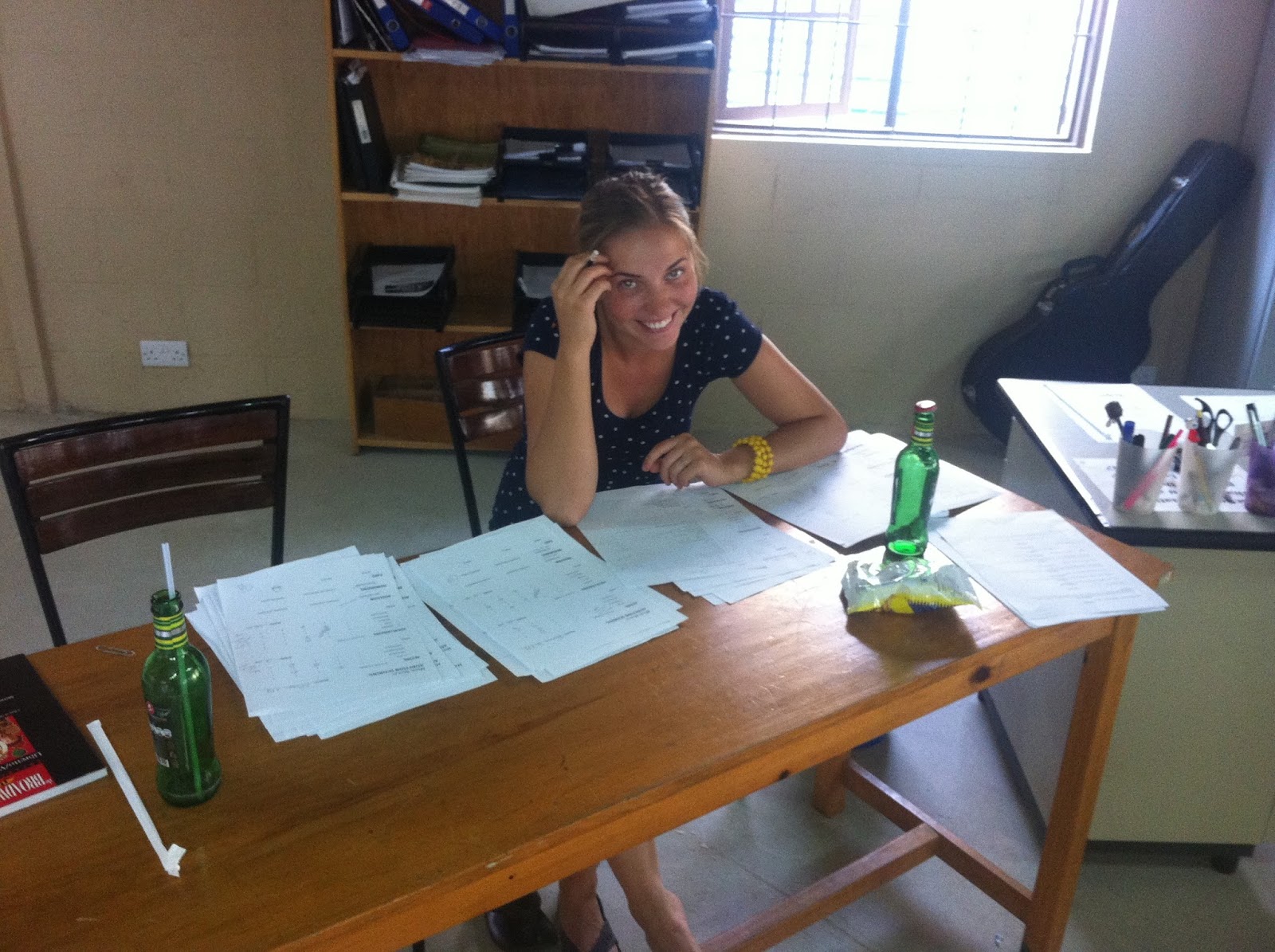 |
| Documenting the mundane: *someone* (who will remain nameless) cannot seem to get the clothes IN the basket. |
Last summer when we visited Canada, I was caught off guard when a few people asked brightly, "So, how was your trip?"
My... trip?
"Where is your tan?!"
Uh ... I work in a classroom every day. It's really not ... Well, it's not that exciting.
I'm afraid there has been some miscommunication, and I'm afraid that a lot of it is my fault. Pictures of exotic birds and monkeys and landscapes can paint a life full of adventure and non-stop novelty. Photos of ministries or volunteering opportunities, along with moving stories, can -- although honest and accurate -- cause people to think that I feel rewarded every day, tangibly "changing" something, seeing an end result.
So I thought I'd describe an average day of whirlwind missions in an exotic location:
5:50 am: Alarm goes off. Fumble for phone, press snooze as quickly as possible.
6:30 am: Stop pressing snooze, get out of bed. Groan to find a crispy dead cockroach by my feet. Scoop it up with toilet paper, wishing Isaac was not in the village all week long so that he could perform his duty of insect control.
Eat something -- anything -- for breakfast. A muffin, a piece of toast, an apple, or a few scoops of yogurt.
Make coffee or tea, fill thermos. Boil water while brushing teeth as not to waste a precious minute.
 |
| Student projects -- Medieval manors! |
7:30: Arrive at school.
 |
| Reviewing auditions and making up the cast list for the school musical. |
12:10: Lunch. Once a week, it's my turn to get the lunches for the detention room. That really breaks up the routine and keeps me on my toes.
More teaching.
 |
| Special days at school -- Wacky Day! |
Staff meeting, possibly. Or a rehearsal for the school play. This includes running lines with students, listening to students sing the musical numbers, and giving my opinion on costumes made out of margarine containers, cereal boxes and expert use of a glue gun.
4:45 - 5:30: Grading, prepping for the next day.
 |
| Muwala interfering with a Saturday marking session ... |
Scrolling through Facebook, Pinterest and blogs ... Reading ... Sometimes grading *yech*
7:30: Turn on water heater.
8:00: Shower.
8:30: Call Isaac. Have deep conversations about paying the water bill and, could you pick up cat food and almond extract on your way home this weekend?
9:00: Lights out, bed. As much as I wish I was a more efficient human being, I need my sleep.
Once a week this routine is disrupted by attending our couples' Bible study (which, ironically, only I attend now as Isaac is in the village all week). This means I'm either going to eat at someone else's house, or hosting 25 people at my house. Sometimes I take a walk in the evening to pick up a few groceries, eyeing stray dogs warily and avoiding getting hit by bodas. About once or twice a week I hang out with one of my friends, either at her place or mine -- and my friends laugh at how I politely kick them out or politely begin to leave promptly around 8. I'm very clear -- I need my sleep. School night bedtime is not negotiable for this teacher.
This is not to complain. This is not to bore you (sorry). I love my job, I love teaching. I love teaching missionary kids and Ugandan kids that I believe will have a great influence in the future. I love supporting missionary families -- MAF pilots, orphanage directors, Bible school professors, church planters. Sometimes I feel a little restless to be out "on the front lines," sometimes I envy Isaac's life in the village (which, let me tell you, is also full of un-exciting hours -- hence his developed obsession with birdwatching), but I really feel that right now I am where God wants me to be. I believe that what I'm doing is building the Kingdom of God.
I'm sure many of you can relate -- whether your calling at the moment is raising kids or cooking at a church camp (why does that one spring to mind, I wonder?) or working at a bank or standing at a cash register or teaching at a college or cleaning people's teeth or setting up chairs before youth group. There's always the hum-drum of daily life, the mundane tasks that no one includes in a newsletter.
And it's the same over here, across the ocean in Uganda.
 |
| But sometimes the day-to-day is where I find the sweetest gems <3 |













